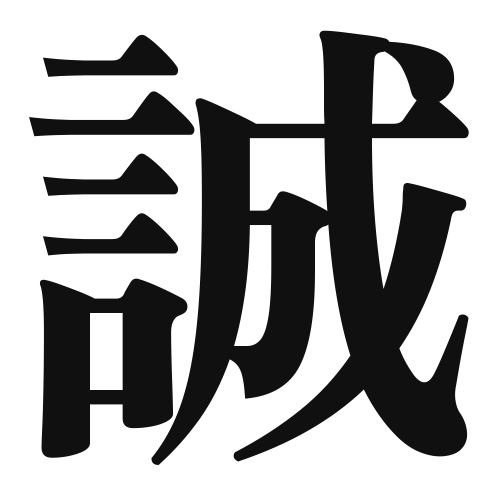1. Overview of Meaning
The kanji “誠” (sei) means “sincerity” or “truthfulness.” It represents a deep sense of honesty and integrity in one’s actions and words.
2. Formation and Radical
Formation of the Kanji: The kanji “誠” is a compound character, combining elements that convey the idea of speaking truthfully. It is classified as a compound character (会意文字), as it combines the radical for “speech” (言) with the concept of “complete” or “whole” (成).
Radical: The radical of “誠” is 言 (gen), which relates to speech or words, emphasizing the importance of truthful communication.
3. Examples of Usage
Common Words and Phrases: Some frequently used words that include “誠” are 誠実 (seijitsu – sincerity) and 誠心 (seishin – heartfelt sincerity).
Example Sentences in Daily Conversation:
- 彼は誠実な人です。 (Kare wa seijitsu na hito desu.) – He is a sincere person.
- 私たちは誠心誠意お手伝いします。 (Watashitachi wa seishin seii otetsudai shimasu.) – We will help you with all our heart.
4. Synonyms and Antonyms
Similar Kanji: A similar kanji is 真 (shin), which means “true” or “real.” While both convey a sense of truth, “誠” emphasizes sincerity in intention, whereas “真” focuses more on factual accuracy.
Opposite Kanji: The opposite of “誠” is 偽 (gi), which means “false” or “deceitful.” This kanji represents dishonesty and a lack of integrity.
5. Cultural and Historical Background
Relation to Japanese Culture: In Japanese culture, “誠” is highly valued, often associated with loyalty and trustworthiness. It is a key virtue in both personal relationships and business practices.
Proverbs and Idioms: One common saying is “誠心誠意” (seishin seii), which means “with all one’s heart and sincerity,” highlighting the importance of genuine intentions in actions.
